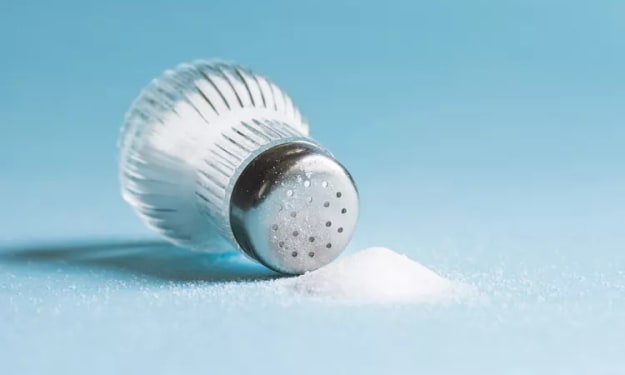Why Nutrition Matters
Are you eating properly for your body?

A piece about the basics of nutrition and why it is important.
I remember being in high school and not caring about what I was putting into my body. I felt sick after almost every meal throughout a day (digestion problems, bloating, upset stomach). These digestive issues started when I was about fourteen. Three years ago, I found out that I am highly allergic to eggs and slightly intolerant to gluten. To add, I also notice digestive problems after eating dairy, meat and fried foods. To add even more, I am a vegetarian. At first, I was devastated that I couldn’t eat my favourite foods but realistically, I just had to make some responsible changes in my diet. I guess you could say I follow a strict diet, however, it is based off a combination of my own beliefs and not wanting to feel sick after eating anymore.
Eating should be enjoyable, not scary. I will admit I have a hard relationship with food sometimes but I am trying each day to not restrict myself too much. I want to eat to feel good and to power myself throughout the day since I am walking around 12 kilometers daily. I also want to enjoy my favourite foods without having to feel guilty or sick after.
Through years of trial and error, I now understand what my body likes to digest. I had never really enjoyed eating meat as a child and felt very confident in becoming vegetarian four years ago, but once the eggs, gluten and dairy were out of the question as well, I became scared that I couldn’t eat anything at all. I guess you could say I am close to being a vegan (no animal products at all), but I don’t like to restrict myself from homemade dinners and treats. If someone offers me a cookie, I will usually take it but will have to deal with the consequences of (gas, bloating, upset stomach, acne). I also will sometimes eat fish if my own family or myself catch it (so I know where it comes from). Personally, this is the diet I follow to nourish my body and respect my allergies
-Gluten free
-Vegetarian
-Dairy Free
-Egg-free
-I try hard to limit sugar, additives, processed foods, fried foods and artificial anything
This is what works best for me. What works best for you may be something completely different. So why don’t I classify myself as a vegan? People ask me this often or just assume that I am one, but to be honest I am not following these diets for the labels. I intend to one day be vegan but as of right now, to fuel my body and cravings I sneak in some dairy at times.
Where I want to go with this article is to stress how food can be used as medicine instead of being harmful to you. The human body is like a plant. We need sun, water and nutrients to flourish! It is amazing how many issues can be solved within the body when you are eating the proper nutrients for yourself.
Nutrition has always been a passion of mine and I hope to pursue a career in it one day. Hopefully focusing on sports nutrition with professional athletes. I want to make this simple for everyone to understand. Since this isn’t yet thought of as mandatory by schools to teach children, many people lack the basic knowledge of a healthy diet. Canada’s Food Guide gives an extremely BASIC meal plan to follow and can be a great reference for newbies. This is a very basic outline of an extremely complex topic.
THE BASICS:
There are 3 main macronutrients (consumed in large quantities) your body uses to produce energy. These are necessary for growth and daily living.
1. CARBOHYDRATES (get turned into sugar for energy)
-whole grains
-fruit and vegetables
2. FATS (also used for energy)
-butter, oils
-avocados, nuts, seeds
3. PROTEINS (build muscle and carry out cellular functions)
-beans, nuts
-dairy and meat
In addition, there are multiple micronutrients (consumed in lesser quantities) we need to consume as well. These are necessary to maintain your health and proper body functions.
VITAMINS
-vitamin A,C,E,D,K
MINERALS
-iron, zinc selenium
ELECTROLYTES
-sodium, potassium, calcium
POWERING OUR BODY
Through food, we power our body. If we are eating unhealthy, low nutrient dense foods, we may not be able to perform optimally. Typically, the average person should be consuming these macronutrient ratios
CARBOHYDRATES (45-65 percent of daily food intake)
FATS (20-35 percent of daily food intake)
PROTEINS (15-25 percent daily food intake)
These percentages vary based on genetics, gender, age, and goals. Most of us are not consuming the proper amounts of these macronutrients. If there is one thing I want people to be eating more of, it is protein. Protein does not provide mass amounts of energy like carbs and fats do but it does increase muscle mass in the body. Having an increased amount of muscle mass aids in carrying out daily tasks, prevents injuries and keeps the body healthy and strong.
Food has always had the ability to affect your body holistically which we tend to ignore. It can change your mood, temperature, physique, energy and cognitive functions. Once you begin starting to eat things that will produce positive effects in the body you will notice you feel better in many aspects. Food is brain power.
Through years of experimenting with food, food allergies, supplements and vitamins here are some ideas of what I like to include daily to stay healthy. Remember everybody is different and this is what works for me the most. You may have some individual preferences but this is a good idea of what everyone needs for a healthy body, mind and soul.
MY BASIC HEALTH TIPS
Eat something green every day.
Green foods contain many vitamins, phytochemicals and minerals. Sea vegetables (seaweed/kelp), green tea, pumpkin seeds and leafy vegetables contain tryptophan. Tryptophan can be converted to serotonin (neurotransmitter). Serotonin improves your mood and cognition = happiness!
Eat protein in every meal.
Protein is so important in our body’s functions. This is especially significant if you are working out often. Protein is necessary for cellular growth and reproduction. Don’t skip it. The average person needs about 1.2 grams of protein per kg of body weight per day. Personally, I aim for 1.5 grams per kg of body weight since I am very active. This calculates to around 95-100 grams of protein per day for myself.
Drink at least eight glasses of water a day.
The human body is 80-90 percent water. Drinking more water has the ability to clear up your skin, increase your digestion and circulation.
Eat real whole foods.
Limit yourself from artificial additives and preservatives. Nature provides us with many opportunities to eat food so we can grow ourselves. Including more whole food into your diet has endless benefits including increased energy, decreased digestive issue, and increased cognition.
Load up on antioxidants.
Antioxidants protect our bodies from free radicals (cancer-causing agents). Most fruits and vegetables contain antioxidants and are easy to include every day. There are many products out there that include antioxidants as well and are easy to consume (vitamin drinks, supplements)
Limit your animal product consumption (meat, butter, cheese, milk).
It has been shown in many studies that mass producing animal farms inject hormones into their animals = hormones and chemicals in your food. Personally, I try to only eat “dairy free” dairy products such as coconut milk, vegan cheese, vegan butter, almond milk. Instead, eating dairy and meat from a local farm is sustainable for the economy and environment and saves animals from abuse. It may be more expensive to buy locally however you will be getting higher quality foods. Switching to non-dairy milk was one of the best decisions I have ever made. If you don’t believe me, look up videos on the internet about dairy farms.
Don’t forget your vitamins.
You may be lacking in certain types. The best way to find out is getting tested with your doctor for certain deficiencies. Here are a few examples of what I take as often as I can to ensure I am feeling my best. I do believe these help me and will help your body function regularly as well (Vitamins B12, C, D, iron, omega-3's, probiotics, and magnesium)
Eat less sugar.
This one is very important. Of course, you cannot eliminate sugar altogether because it is still found in many natural foods. Eliminate artificial sweeteners. No more sugar in your coffee, less treats and sugary drinks. There are many alternative sweeteners the body likes more (honey, agave, stevia, real maple syrup). Excess sugar consumption can lead to insulin resistance which is a risk factor for developing Type 2 Diabetes.
Eat as natural as you can.
The fewer ingredients the better. The more natural the better. Take advantage of Earth’s creations.
Include HIGH-nutrient foods every day.
AT LEAST five to ten fruit and veggies. Then also, nuts, seeds, beans, greens etc. Anything “weird” is usually good for you (kale, chia seeds, matcha tea). Don’t be afraid of trying something new. Sometimes I like to think "the weirder it is, the better it is for you."
Personally, I always want to try out the weirdest foods. I love everything green. Here is a quick list of some of my favourite foods I aim to eat every day and their potential benefits to your health.
Matcha - "Enhances mood and aids in concentration”
Kale - "the potassium content of kale may help reduce the risk of heart disease.”
Chia seeds - "high amounts (48–130 percent DV) of the dietary minerals calcium, iron, magnesium, manganese, phosphorus and zinc”
Moringa powder - "Moringa is considered to have the highest protein ratio of any plant so far identified”
Lemon - "Vitamin C is needed to produce collagen, it may help relieve asthma symptoms, and it may protect against cancer”
I’m going to repeat myself again by saying that this is a simple outline of a very complex topic. It took me years to figure out what my body digests properly and I still have more to explore. Don’t rush the process of making changes in your diet but slowly adapt yourself to eliminating toxins and chemicals. Making healthier choices will only give you positive benefits in the long run.
I encourage you to eat to nourish your body not hurt it. Eat to heal yourself. To allow yourself to grow properly. Be grateful of your ability to obtain food whenever you want it. Don't take on flash diets or quick fixes. Make a lifestyle change for long-term results. My goal is always to feel better to be able to perform better in all of life’s aspects (fitness, relationships, happiness, health), and I hope this can help some people become more aware of their eating as well.
Thank you for reading my opinion on nutrition and what I do to help me flourish. If you have any questions, please feel free to ask me. Maybe one day when I have more time I can start posting recipes. The picture in this article is a green smoothie bowl with coconut chips, matcha, seeds and frozen chocolate covered bananas.
About the Creator
Abby Verigin
Bachelor of Physical Education and Coaching, Fitness and Yoga Instructor, Wellness Coach from British Columbia, Canada.






Comments
There are no comments for this story
Be the first to respond and start the conversation.